2.3 Unit 2 Daily life Grammar(课件)
文档属性
| 名称 | 2.3 Unit 2 Daily life Grammar(课件) | 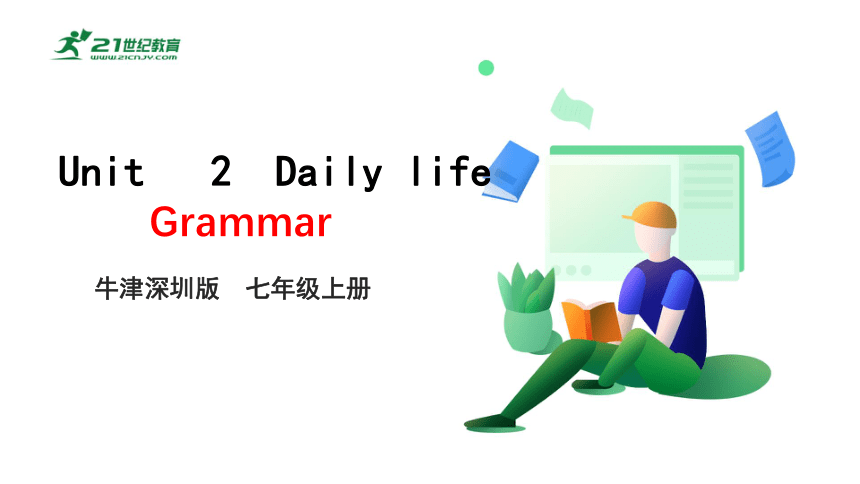 | |
| 格式 | pptx | ||
| 文件大小 | 2.5MB | ||
| 资源类型 | 试卷 | ||
| 版本资源 | 牛津深圳版 | ||
| 科目 | 英语 | ||
| 更新时间 | 2022-10-25 08:57:25 | ||
图片预览


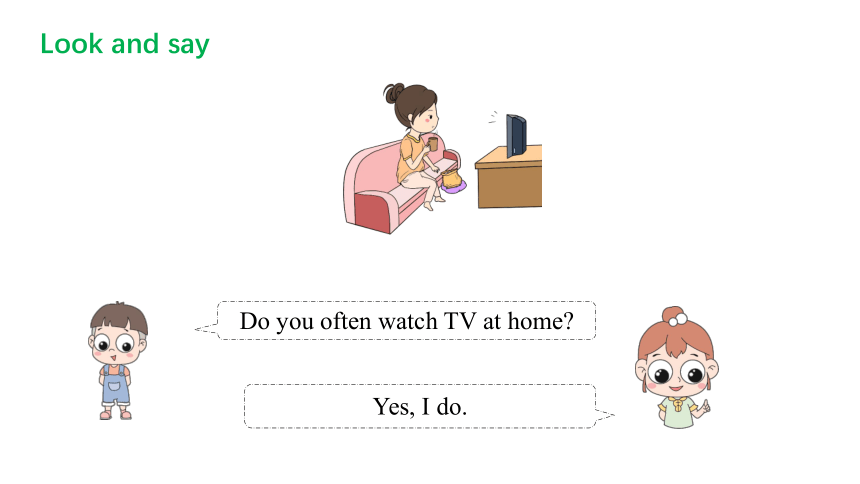
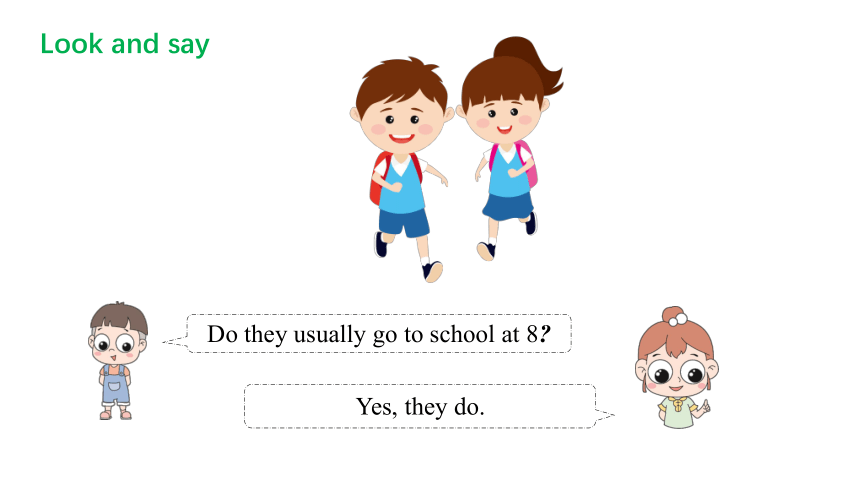
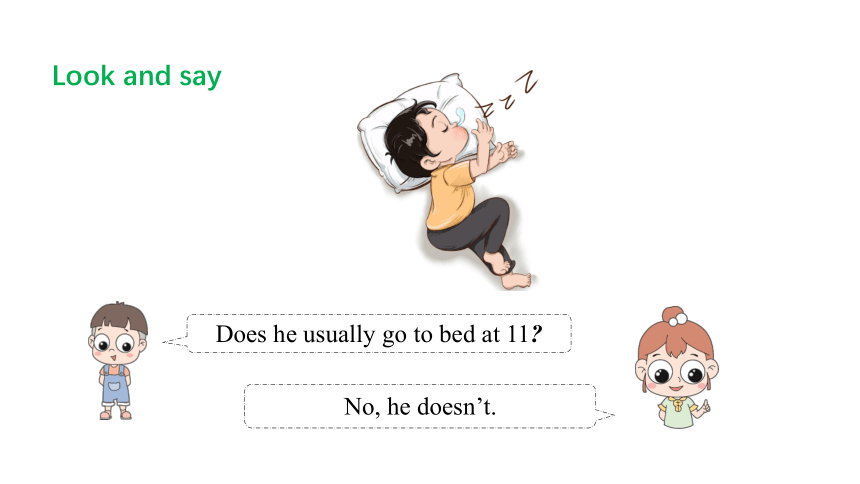
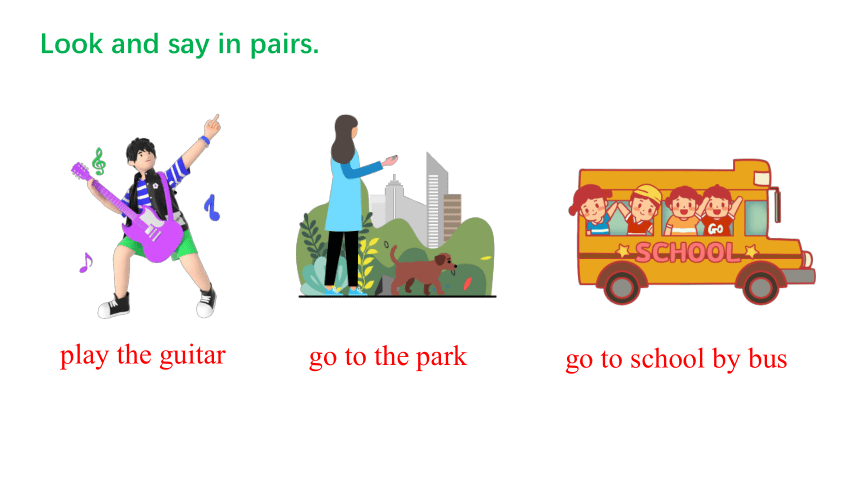
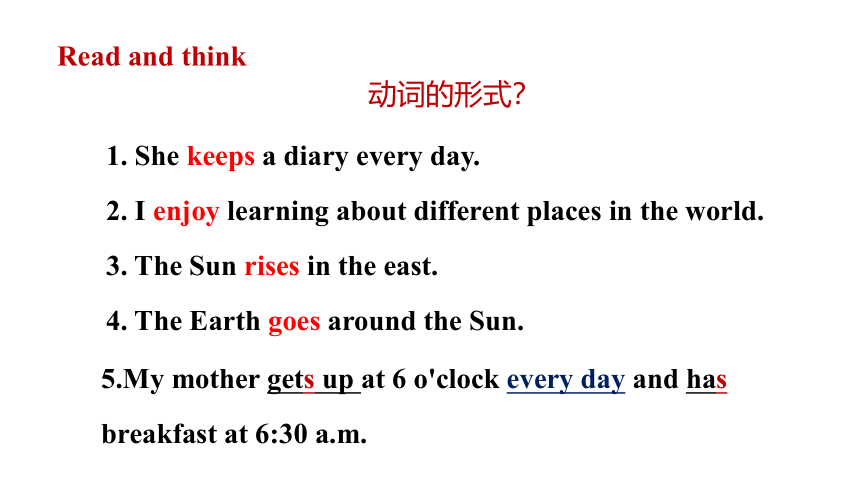
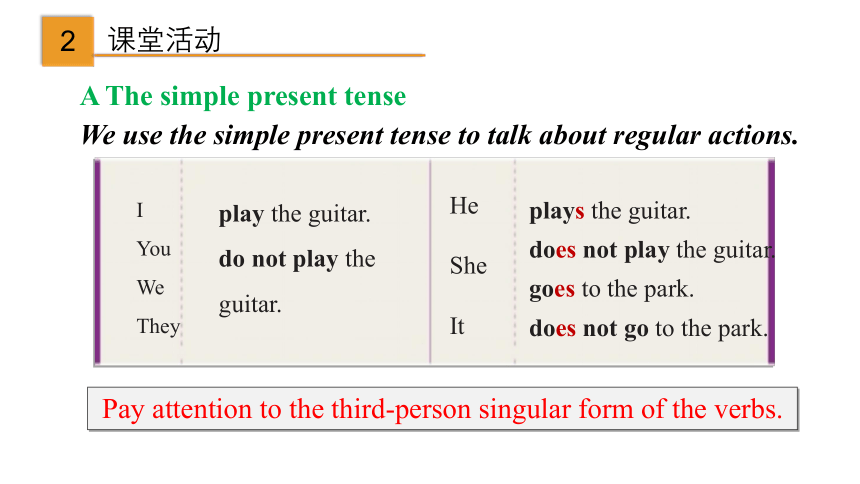
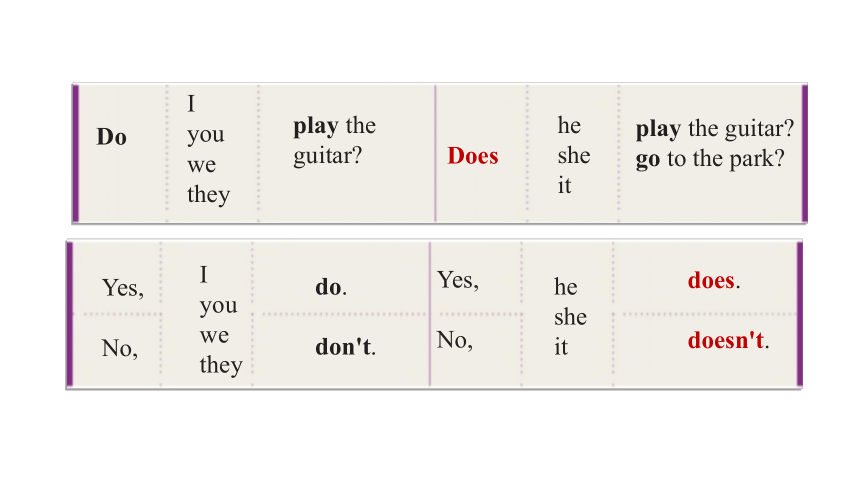
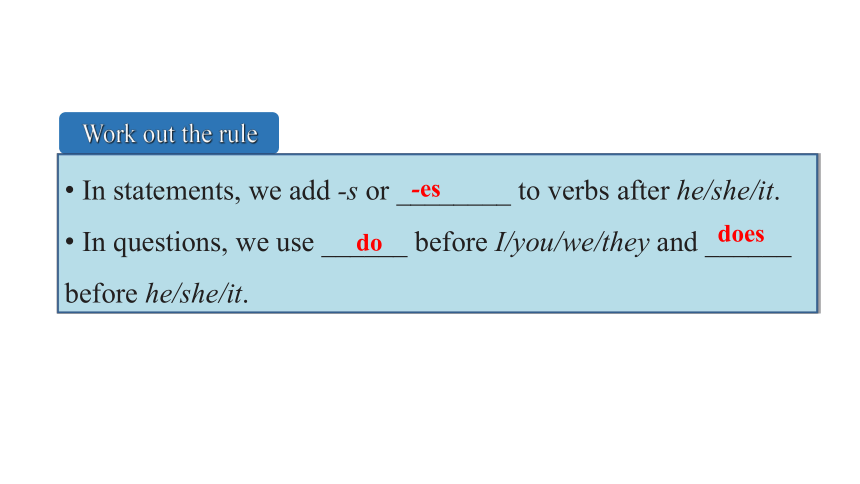
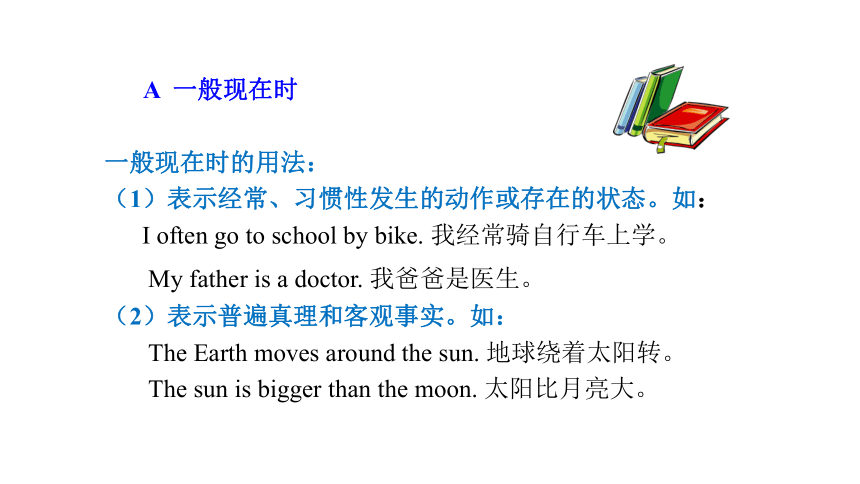
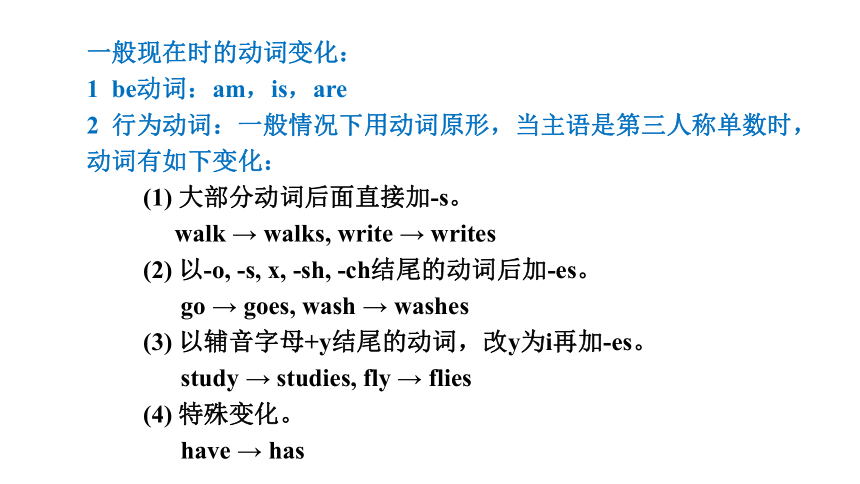
文档简介
(共44张PPT)
Unit 2 Daily life
Grammar
牛津深圳版 七年级上册
I usually get up at 7.
Look and say
She usually gets up at 7.
1
课堂导入
Do you often watch TV at home
Yes, I do.
Look and say
Do they usually go to school at 8
Yes, they do.
Look and say
Does he usually go to bed at 11
No, he doesn’t.
Look and say
Look and say in pairs.
play the guitar
go to the park
go to school by bus
Read and think
1. She keeps a diary every day.
2. I enjoy learning about different places in the world.
3. The Sun rises in the east.
4. The Earth goes around the Sun.
动词的形式?
5.My mother gets up at 6 o'clock every day and has breakfast at 6:30 a.m.
I
You
We
They
play the guitar.
do not play the
guitar.
He
She
It
plays the guitar.
does not play the guitar.
goes to the park.
does not go to the park.
Pay attention to the third-person singular form of the verbs.
2
课堂活动
A The simple present tense
We use the simple present tense to talk about regular actions.
I
you
we
they
Do
play the
guitar
Does
he
she
it
play the guitar
go to the park
Yes,
No,
I
you
we
they
do.
don't.
Yes,
No,
he
she
it
does.
doesn't.
Work out the rule
In statements, we add -s or ________ to verbs after he/she/it.
In questions, we use ______ before I/you/we/they and ______
before he/she/it.
-es
do
does
A 一般现在时
一般现在时的用法:
(1)表示经常、习惯性发生的动作或存在的状态。如:
I often go to school by bike. 我经常骑自行车上学。
My father is a doctor. 我爸爸是医生。
(2)表示普遍真理和客观事实。如:
The Earth moves around the sun. 地球绕着太阳转。
The sun is bigger than the moon. 太阳比月亮大。
一般现在时的动词变化:
1 be动词:am,is,are
2 行为动词:一般情况下用动词原形,当主语是第三人称单数时,动词有如下变化:
(1) 大部分动词后面直接加-s。
walk → walks, write → writes
(2) 以-o, -s, x, -sh, -ch结尾的动词后加-es。
go → goes, wash → washes
(3) 以辅音字母+y结尾的动词,改y为i再加-es。
study → studies, fly → flies
(4) 特殊变化。
have → has
talk_____ forget_____ hope_____
stop_____ perform_____ play_____
say_____ buy_____ worry_____
fly_____ study_____ like_____
make_____ take_____ love_____
recite_____ become_____ come_____
drive_____ shine_____ leave_____
wake_____ ride_____ write_____
给出下列动词的第三人称单数
talks
forgets
hopes
stops
performs
plays
says
buys
worries
flies
studies
likes
makes
takes
loves
recites
becomes
comes
drives
shines
leaves
wakes
rides
writes
(行为动词)一般现在时的各种句式:
1 肯定句:主语+动词原形(或-s/-es)+ …… 如:
We go to school by bike every day. 我们每天骑自行车上学。
Mary swims very well. 玛丽游泳游得很好。
2 否定句:主语+do not/does not(或don’t/doesn’t)+动词原形+…如:
I don’t have a pen. 我没有钢笔。
She doesn’t like music. 她不喜欢音乐。
3 一般疑问句:Do/Does+主语+动词原形+……?
肯定回答:Yes, 主语+do/does.
否定回答:No, 主语+don’t/doesn’t. 如:
— Do they want to go there 他们想去那儿吗?
— Yes, they do. / No, they don’t. 是的,他们想去(不,他们不想去)。
— Does he play basketball after school 他放学后打篮球吗?
— Yes, he does. / No, he doesn’t. 是的,他打。(不,他不打。)
4 特殊疑问句:疑问词+do/does+主语+动词原形+……?如:
When do you get up every day 你每天几点起床?
What does your father do 你爸爸做什么工作?
一般现在时的时间状语:
always 总是 usually 通常 often 经常
sometimes 有时 seldom 很少 never 从
every day 每天
every week 每周
every month 每月
every year 每年
every morning 每天早上
every night 每天晚上
every Monday 每周一
Use the information in the article on Page 17 to complete the conversation below.
S1: (1)_______ Sam ______(go) to school by bus
S2: No, he (2)________. He (3)______(go) to school on foot.
S1: (4)______ Sam and his friends _____(play) games during the
morning break
S2: Yes, they (5)______.
S1: What (6)______ Sam _____(do) after school
S2: He (7)_______(take) part in the school band practice.
Does
go
doesn't
goes
Do
play
do
does
do
takes
A1
In pairs, talk about the things in the box.
go to school by bus
study Chinese, Maths and English in the morning
take part in after-school activities
A2
S1: Do you study Chinese, Maths and English in the morning
S2: Yes, I do./No, I don't.
S1: Does Sam study Chinese, Maths and English in the morning
S2: Yes, he does.
S1: Do you take part in after-school activities
S2: Yes, I do./No, I don't.
S1: Does Sam take part in after-school activities
S2: Yes, he does.
We use adverbs and adverbial phrases of frequency to talk about how often things happen.
B Adverbs and adverbial phrases of frequency
I always/ usually/ often/sometimes/
seldom/ never go to school on foot.
Adverbial phrases of frequency
Work out the rule
1. Adverbs of frequency come (before/after) the main verbs.
2. Adverbial phrases of frequency often come (in the middle/at the end) of a sentence. Sometimes they come at the beginning.
I go to the English Club
On Saturdays,
Once a month,
every day.
twice a week.
I go to the park.
一、定义
always, usually, often, sometimes, never等词在英文中被称为“频度副词”,是用来表示动作的频率,但程度上有别。一般来说按频率大小排列为:
always>usually>often>sometimes>seldom(很少)>never
频度副词
always
usually
often
sometimes
never
频度副词大家族
0%
100%
always
总是
通常
经常
有时
从不
usually
often
sometimes
never
seldom
二、位置
always, usually, often, sometimes, never等词一般用在be动词、情态动词或助动词之后、行为动词之前。
I will never forget the first time I met you.
我将永远忘不了和你的第一次见面。
We often go there.
我们常去那儿。
Mary always help others.
玛丽总是帮助别人。
She is sometimes very busy.
她有时很忙。
三、用法
1. always意为“总是,一直”,这是频率最高的词,表示动作反复,状态持续,不间断。其反义词是never,意为“从不”。如果要变为否定句,应将always改为never才能全部否定。另外,当always与进行时态连用时,常表示“总是”,带有厌烦、不满或赞美等感彩。如:
Li Ping is always late for school.
李平上学总是迟到。
Li Ping is never late for school.
李平上学从不迟到。(全部否定)
Li Ping is not always late for school.
李平上学不总是迟到。(部分否定)
The boy is always asking for money.
这个小男孩总是要钱。(表厌烦)
He is always thinking of others.
他总是想着别人。(赞叹)
She is always asking silly questions.
她老是问些愚蠢的问题。(厌烦)
2. usually意为“通常”,表示习惯性动作或状态,很少例外。如:
We usually go to school at seven in the morning.
我们通常在早上七点上学。
My mother and I usually go shopping on Sundays.
我和妈妈通常在星期天去买东西。
3. often意为“经常,时常”,表示反复性的动作或状态,中间有间断。其反义词是seldom, 意为“很少,不常”。often在句尾时常被very或quite修饰。如:
The boys often eat noodles and the girls sometimes eat them.
男生经常吃面条,女生有时吃。
I often chat with my friends under the big tree.
我经常在这棵大树下和朋友聊天。
He writes to his friends quite often.
他常给他的朋友写信。
4. sometimes意为“有时”,表示动作偶尔发生,间隔较长。其位置比较灵活,放在句首、句中、句末都可。如:
Sometimes we go to the cinema and at other times we go for a walk.
有时我们去看电影,有时我们去散步。
I sometimes watch TV in the evening.
我有时晚上看电视。
My father has lunch in the factory sometimes.
我父亲有时在工厂吃午饭。
5. seldom意为“很少,不常”,表示否定意义。如:
The little girl seldom goes out.
这个小女孩很少外出。
He seldom gives his wife a present, does he
他不常给妻子送礼物,是吗?
6. never意为“从来不,从来没有”,也表示否定意义,它表示从未发生的动作或情况,没有例外。如:
The boys never eat chocolate and the girls seldom eat it.
男生从不吃巧克力,女生很少吃。
Better late than never. [谚语]
迟到(迟做)总比不来(不做)好。
另外,once a year (每年一次), twice a week (每周两次), three times a day (一天三次), every Saturday afternoon(每星期六下午)等,这些时间状语也表示频率,它们可以和频度副词用在同一个句子中,表达上没有重复。如:
We usually go to the cinema four times a month.
我们通常一个月看四次电影。
7. 对这些频度副词提问时,用how often, 表示“每(隔)多长时间做一次”的意思。如:
I write to my brother sometimes.
→ How often do you write to your brother
I watch TV every Sunday evening.
→How often do you watch TV
Mandy meets Sam on the Internet again. She is asking Sam some questions about his life. Write Sam's answers in complete sentences.
Mandy:
Sam:
Mandy:
Sam:
Mandy:
Sam:
How often do you watch television
(1)_________________________________ (every night)
How often do you eat out
(2) ________________________________ (sometimes)
How often do you play table tennis with your father
(3) ___________________________________________
I sometimes eat out.
I watch television every night.
I play table tennis with my father once a week.
Mandy meets Sam on the Internet again. She is asking Sam some questions about his life. Write Sam's answers in complete sentences.
How often do you win
(4) ________________ (seldom)
How often do you visit other cities
(5) ________________________________ (four times a year)
How often do you play computer games
(6) ________________________________ (never)
Mandy:
Sam:
Mandy:
Sam:
Mandy:
Sam:
I seldom win.
I visit other cities four times a year.
I never play computer games.
1 学习了一般现在时构成,用法。
2 掌握一般现在时态肯定句,疑问句,否定句如何变化。
3 掌握频度副词的用法。(always/usually/often/sometimes/ seldom/ never)
3
课堂小结
(一)单项选择。
1 He often ______ to school on foot.
A. go B. going C. goes D. to go
2 The Moon _____ smaller than the Earth.
A. am B. is C. are D. be
3 Mary usually _____ her homework at 8∶30 p.m.
A. finishes B. finish C. finishs D. finishing
4 — _____ do you go swimming — Once a week.
A. How many B. How much C. How often D. How old
5 She lives far from school, but she is _____ late for class.
A. always B. never C. often D. usually
4
课堂训练
C
B
A
C
B
6 — Does he _____ Geography
— No, he doesn’t. He _____ History.
like; like B. like; likes C. likes; like D. likes; likes
7 What _____ you usually do on Sunday
are B. is C. does D. do
8 ______ he play basketball every day
Do B. Is C. Are D. Does
9 She usually _____ late at night.
A. study B. studys C. studies D. studyes
10 What _____ your mother do
A. does B. do C. is D. are
B
D
C
D
A
(二)用所给动词的适当形式填空。
1 Alice ___________ (not eat) bread for breakfast. She often _______ (eat) noodles.
2 My mother _____ (be) a teacher. She _______ (teach) in a junior high school.
3 I __________ (not watch) TV on weekdays.
4 His parents _____ (be) doctors. They ______ (work) in a big hospital.
5 — ______ you ______ (get) up early every day — Yes, I ______.
6 — _____ Sam ______ (like) Geography — Yes, he ______.
7 — _____ Anna and Kate often ______ (play) music together — No, they _____.
8 — _____ your father ______ (drive) the school bus — No, he _______.
9 — Why _____ you _____ (go) to school on foot
— Because my school _____ (be) close to my home.
10 — When _____ your mother _____ (go) to work every day
— She usually ______ (go) to work at 8 a.m.
doesn’t eat
eats
is
teaches
don’t watch
are
work
Do get
do
Does
like
does
Do
play
don’t
Does
drive
doesn’t
do
go
is
does go
goes
(三)按要求改写句子。
1 Cindy helps her mother do housework. (改为否定句)
2 His parents work hard. (改为否定句)
3 My elder sister doesn’t like Geography. (改为肯定句)
4 I don’t know her very well. (改为肯定句)
5 Simon usually does his homework after super. (改为一般疑问句)
Cindy doesn’t help her mother do housework.
His parents don’t work hard.
My elder sister likes Geography.
I know her very well.
Does Simon usually do his homework after super
6 The students like talking about their hobbies. (改为一般疑问句)
7 My father goes fishing every weekend. (对画线部分提问)
8 They often play football on the playground. (对画线部分提问)
9 Anna goes to school by school bus. (对画线部分提问)
10 I usually go shopping on Saturday. (对画线部分提问)
Do the students like talking about their hobbies
What does your father do every weekend
Where do they often play football
How does Anna go to school
When do you usually go shopping
谢谢
21世纪教育网(www.21cnjy.com)
中小学教育资源网站
兼职招聘:
https://www.21cnjy.com/recruitment/home/admin
Unit 2 Daily life
Grammar
牛津深圳版 七年级上册
I usually get up at 7.
Look and say
She usually gets up at 7.
1
课堂导入
Do you often watch TV at home
Yes, I do.
Look and say
Do they usually go to school at 8
Yes, they do.
Look and say
Does he usually go to bed at 11
No, he doesn’t.
Look and say
Look and say in pairs.
play the guitar
go to the park
go to school by bus
Read and think
1. She keeps a diary every day.
2. I enjoy learning about different places in the world.
3. The Sun rises in the east.
4. The Earth goes around the Sun.
动词的形式?
5.My mother gets up at 6 o'clock every day and has breakfast at 6:30 a.m.
I
You
We
They
play the guitar.
do not play the
guitar.
He
She
It
plays the guitar.
does not play the guitar.
goes to the park.
does not go to the park.
Pay attention to the third-person singular form of the verbs.
2
课堂活动
A The simple present tense
We use the simple present tense to talk about regular actions.
I
you
we
they
Do
play the
guitar
Does
he
she
it
play the guitar
go to the park
Yes,
No,
I
you
we
they
do.
don't.
Yes,
No,
he
she
it
does.
doesn't.
Work out the rule
In statements, we add -s or ________ to verbs after he/she/it.
In questions, we use ______ before I/you/we/they and ______
before he/she/it.
-es
do
does
A 一般现在时
一般现在时的用法:
(1)表示经常、习惯性发生的动作或存在的状态。如:
I often go to school by bike. 我经常骑自行车上学。
My father is a doctor. 我爸爸是医生。
(2)表示普遍真理和客观事实。如:
The Earth moves around the sun. 地球绕着太阳转。
The sun is bigger than the moon. 太阳比月亮大。
一般现在时的动词变化:
1 be动词:am,is,are
2 行为动词:一般情况下用动词原形,当主语是第三人称单数时,动词有如下变化:
(1) 大部分动词后面直接加-s。
walk → walks, write → writes
(2) 以-o, -s, x, -sh, -ch结尾的动词后加-es。
go → goes, wash → washes
(3) 以辅音字母+y结尾的动词,改y为i再加-es。
study → studies, fly → flies
(4) 特殊变化。
have → has
talk_____ forget_____ hope_____
stop_____ perform_____ play_____
say_____ buy_____ worry_____
fly_____ study_____ like_____
make_____ take_____ love_____
recite_____ become_____ come_____
drive_____ shine_____ leave_____
wake_____ ride_____ write_____
给出下列动词的第三人称单数
talks
forgets
hopes
stops
performs
plays
says
buys
worries
flies
studies
likes
makes
takes
loves
recites
becomes
comes
drives
shines
leaves
wakes
rides
writes
(行为动词)一般现在时的各种句式:
1 肯定句:主语+动词原形(或-s/-es)+ …… 如:
We go to school by bike every day. 我们每天骑自行车上学。
Mary swims very well. 玛丽游泳游得很好。
2 否定句:主语+do not/does not(或don’t/doesn’t)+动词原形+…如:
I don’t have a pen. 我没有钢笔。
She doesn’t like music. 她不喜欢音乐。
3 一般疑问句:Do/Does+主语+动词原形+……?
肯定回答:Yes, 主语+do/does.
否定回答:No, 主语+don’t/doesn’t. 如:
— Do they want to go there 他们想去那儿吗?
— Yes, they do. / No, they don’t. 是的,他们想去(不,他们不想去)。
— Does he play basketball after school 他放学后打篮球吗?
— Yes, he does. / No, he doesn’t. 是的,他打。(不,他不打。)
4 特殊疑问句:疑问词+do/does+主语+动词原形+……?如:
When do you get up every day 你每天几点起床?
What does your father do 你爸爸做什么工作?
一般现在时的时间状语:
always 总是 usually 通常 often 经常
sometimes 有时 seldom 很少 never 从
every day 每天
every week 每周
every month 每月
every year 每年
every morning 每天早上
every night 每天晚上
every Monday 每周一
Use the information in the article on Page 17 to complete the conversation below.
S1: (1)_______ Sam ______(go) to school by bus
S2: No, he (2)________. He (3)______(go) to school on foot.
S1: (4)______ Sam and his friends _____(play) games during the
morning break
S2: Yes, they (5)______.
S1: What (6)______ Sam _____(do) after school
S2: He (7)_______(take) part in the school band practice.
Does
go
doesn't
goes
Do
play
do
does
do
takes
A1
In pairs, talk about the things in the box.
go to school by bus
study Chinese, Maths and English in the morning
take part in after-school activities
A2
S1: Do you study Chinese, Maths and English in the morning
S2: Yes, I do./No, I don't.
S1: Does Sam study Chinese, Maths and English in the morning
S2: Yes, he does.
S1: Do you take part in after-school activities
S2: Yes, I do./No, I don't.
S1: Does Sam take part in after-school activities
S2: Yes, he does.
We use adverbs and adverbial phrases of frequency to talk about how often things happen.
B Adverbs and adverbial phrases of frequency
I always/ usually/ often/sometimes/
seldom/ never go to school on foot.
Adverbial phrases of frequency
Work out the rule
1. Adverbs of frequency come (before/after) the main verbs.
2. Adverbial phrases of frequency often come (in the middle/at the end) of a sentence. Sometimes they come at the beginning.
I go to the English Club
On Saturdays,
Once a month,
every day.
twice a week.
I go to the park.
一、定义
always, usually, often, sometimes, never等词在英文中被称为“频度副词”,是用来表示动作的频率,但程度上有别。一般来说按频率大小排列为:
always>usually>often>sometimes>seldom(很少)>never
频度副词
always
usually
often
sometimes
never
频度副词大家族
0%
100%
always
总是
通常
经常
有时
从不
usually
often
sometimes
never
seldom
二、位置
always, usually, often, sometimes, never等词一般用在be动词、情态动词或助动词之后、行为动词之前。
I will never forget the first time I met you.
我将永远忘不了和你的第一次见面。
We often go there.
我们常去那儿。
Mary always help others.
玛丽总是帮助别人。
She is sometimes very busy.
她有时很忙。
三、用法
1. always意为“总是,一直”,这是频率最高的词,表示动作反复,状态持续,不间断。其反义词是never,意为“从不”。如果要变为否定句,应将always改为never才能全部否定。另外,当always与进行时态连用时,常表示“总是”,带有厌烦、不满或赞美等感彩。如:
Li Ping is always late for school.
李平上学总是迟到。
Li Ping is never late for school.
李平上学从不迟到。(全部否定)
Li Ping is not always late for school.
李平上学不总是迟到。(部分否定)
The boy is always asking for money.
这个小男孩总是要钱。(表厌烦)
He is always thinking of others.
他总是想着别人。(赞叹)
She is always asking silly questions.
她老是问些愚蠢的问题。(厌烦)
2. usually意为“通常”,表示习惯性动作或状态,很少例外。如:
We usually go to school at seven in the morning.
我们通常在早上七点上学。
My mother and I usually go shopping on Sundays.
我和妈妈通常在星期天去买东西。
3. often意为“经常,时常”,表示反复性的动作或状态,中间有间断。其反义词是seldom, 意为“很少,不常”。often在句尾时常被very或quite修饰。如:
The boys often eat noodles and the girls sometimes eat them.
男生经常吃面条,女生有时吃。
I often chat with my friends under the big tree.
我经常在这棵大树下和朋友聊天。
He writes to his friends quite often.
他常给他的朋友写信。
4. sometimes意为“有时”,表示动作偶尔发生,间隔较长。其位置比较灵活,放在句首、句中、句末都可。如:
Sometimes we go to the cinema and at other times we go for a walk.
有时我们去看电影,有时我们去散步。
I sometimes watch TV in the evening.
我有时晚上看电视。
My father has lunch in the factory sometimes.
我父亲有时在工厂吃午饭。
5. seldom意为“很少,不常”,表示否定意义。如:
The little girl seldom goes out.
这个小女孩很少外出。
He seldom gives his wife a present, does he
他不常给妻子送礼物,是吗?
6. never意为“从来不,从来没有”,也表示否定意义,它表示从未发生的动作或情况,没有例外。如:
The boys never eat chocolate and the girls seldom eat it.
男生从不吃巧克力,女生很少吃。
Better late than never. [谚语]
迟到(迟做)总比不来(不做)好。
另外,once a year (每年一次), twice a week (每周两次), three times a day (一天三次), every Saturday afternoon(每星期六下午)等,这些时间状语也表示频率,它们可以和频度副词用在同一个句子中,表达上没有重复。如:
We usually go to the cinema four times a month.
我们通常一个月看四次电影。
7. 对这些频度副词提问时,用how often, 表示“每(隔)多长时间做一次”的意思。如:
I write to my brother sometimes.
→ How often do you write to your brother
I watch TV every Sunday evening.
→How often do you watch TV
Mandy meets Sam on the Internet again. She is asking Sam some questions about his life. Write Sam's answers in complete sentences.
Mandy:
Sam:
Mandy:
Sam:
Mandy:
Sam:
How often do you watch television
(1)_________________________________ (every night)
How often do you eat out
(2) ________________________________ (sometimes)
How often do you play table tennis with your father
(3) ___________________________________________
I sometimes eat out.
I watch television every night.
I play table tennis with my father once a week.
Mandy meets Sam on the Internet again. She is asking Sam some questions about his life. Write Sam's answers in complete sentences.
How often do you win
(4) ________________ (seldom)
How often do you visit other cities
(5) ________________________________ (four times a year)
How often do you play computer games
(6) ________________________________ (never)
Mandy:
Sam:
Mandy:
Sam:
Mandy:
Sam:
I seldom win.
I visit other cities four times a year.
I never play computer games.
1 学习了一般现在时构成,用法。
2 掌握一般现在时态肯定句,疑问句,否定句如何变化。
3 掌握频度副词的用法。(always/usually/often/sometimes/ seldom/ never)
3
课堂小结
(一)单项选择。
1 He often ______ to school on foot.
A. go B. going C. goes D. to go
2 The Moon _____ smaller than the Earth.
A. am B. is C. are D. be
3 Mary usually _____ her homework at 8∶30 p.m.
A. finishes B. finish C. finishs D. finishing
4 — _____ do you go swimming — Once a week.
A. How many B. How much C. How often D. How old
5 She lives far from school, but she is _____ late for class.
A. always B. never C. often D. usually
4
课堂训练
C
B
A
C
B
6 — Does he _____ Geography
— No, he doesn’t. He _____ History.
like; like B. like; likes C. likes; like D. likes; likes
7 What _____ you usually do on Sunday
are B. is C. does D. do
8 ______ he play basketball every day
Do B. Is C. Are D. Does
9 She usually _____ late at night.
A. study B. studys C. studies D. studyes
10 What _____ your mother do
A. does B. do C. is D. are
B
D
C
D
A
(二)用所给动词的适当形式填空。
1 Alice ___________ (not eat) bread for breakfast. She often _______ (eat) noodles.
2 My mother _____ (be) a teacher. She _______ (teach) in a junior high school.
3 I __________ (not watch) TV on weekdays.
4 His parents _____ (be) doctors. They ______ (work) in a big hospital.
5 — ______ you ______ (get) up early every day — Yes, I ______.
6 — _____ Sam ______ (like) Geography — Yes, he ______.
7 — _____ Anna and Kate often ______ (play) music together — No, they _____.
8 — _____ your father ______ (drive) the school bus — No, he _______.
9 — Why _____ you _____ (go) to school on foot
— Because my school _____ (be) close to my home.
10 — When _____ your mother _____ (go) to work every day
— She usually ______ (go) to work at 8 a.m.
doesn’t eat
eats
is
teaches
don’t watch
are
work
Do get
do
Does
like
does
Do
play
don’t
Does
drive
doesn’t
do
go
is
does go
goes
(三)按要求改写句子。
1 Cindy helps her mother do housework. (改为否定句)
2 His parents work hard. (改为否定句)
3 My elder sister doesn’t like Geography. (改为肯定句)
4 I don’t know her very well. (改为肯定句)
5 Simon usually does his homework after super. (改为一般疑问句)
Cindy doesn’t help her mother do housework.
His parents don’t work hard.
My elder sister likes Geography.
I know her very well.
Does Simon usually do his homework after super
6 The students like talking about their hobbies. (改为一般疑问句)
7 My father goes fishing every weekend. (对画线部分提问)
8 They often play football on the playground. (对画线部分提问)
9 Anna goes to school by school bus. (对画线部分提问)
10 I usually go shopping on Saturday. (对画线部分提问)
Do the students like talking about their hobbies
What does your father do every weekend
Where do they often play football
How does Anna go to school
When do you usually go shopping
谢谢
21世纪教育网(www.21cnjy.com)
中小学教育资源网站
兼职招聘:
https://www.21cnjy.com/recruitment/home/admin
